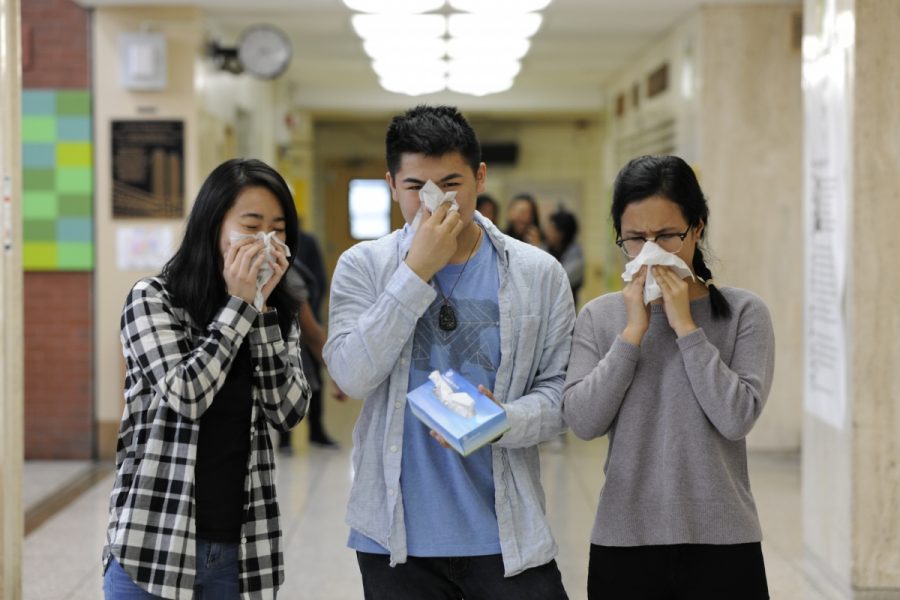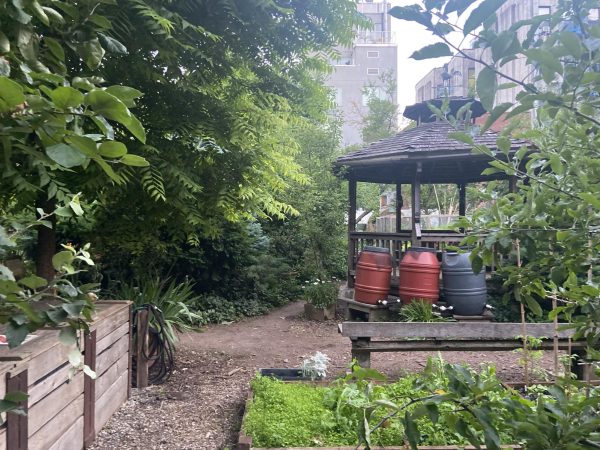Say Goodbye to Hay Fever
Ways to Treat Your Seasonal Allergies
Cassie Tian ’19, Gene Lam ’18, and Tsering Sherpa ’18 brace for the battle that is allergy season.
Referred to as spring allergies, hay fever, and pollinosis, seasonal allergic rhinitis describes the symptoms of allergies caused by plant pollens. Millions of people in America suffer from this allergy, and the severity of the symptoms can vary greatly due to various factors, such as humidity, temperature, time of day, and area. Fortunately, there are many treatments, natural and pharmaceutical, that can alleviate the burdens caused by hay fever.
Plants release pollen (an allergen) into the air as they bloom, which reacts with the immune system of someone who is sensitive to it. When triggered, pollen allergies can cause itchy eyes and throat, coughing, sneezing, and a runny nose.
Allergies can also affect productivity, concentration, and sleep schedules, especially when a side effect of many medications taken to reduce those symptoms is drowsiness. “I always had to decide between breathing properly and falling asleep after taking Benadryl or deciding to just keep sniffling,” said Tsering Sherpa ’18. “It is so strong but it really works; it just knocks me out for a long time.” For some, allergies are so severe that they interfere greatly with their daily lives. “I have to take monthly allergy shots, year round, or else it becomes so bad that I have to miss school. On top of that, I take allergy medication every day,” said Cassie Tian ’19.
“I always had to decide between breathing properly and falling asleep after taking Benadryl or deciding to just keep sniffling,” said Tsering Sherpa ’18.
Non-medicinal, simple, and quick ways to help deal with the allergy season also exist. One tip is to check the pollen count for the day, as Sherpa does. “Since spring started, I’ve been checking the levels of pollen outside every morning on the Weather Channel app, and if it seems bad, I take a Zyrtec before I leave the house and before my symptoms start.” It’s crucial to check the quality of the air, which irritates the respiratory system and can cause sinus discomfort. For those with asthma, it can be deadly. One solution is the use of particle masks to prevent the intake of allergen particles.
A way to deal with congestion is to breathe in steamed air. “For a stuffy nose, you can put a blanket on your head while leaning over a bowl of boiling water and that gets the steam into your nose,” said Gene Lam ’18, who also has severe allergies.
To further alleviate discomfort at home, closing the windows and taking warm showers after coming indoors to clear up sinuses and wash off pollen from the hair and skin can help. A more permanent solution, immunotherapy, is also available. Allergy shots have been proven to relieve long-term relief of allergic rhinitis.
When all else fails, there are some unconventional methods of coping with allergies. Probiotics are known to lower nasal congestion. Some examples of probiotic foods are kimchi (a traditional Korean side dish), dark chocolate, and yogurt. Some of these unique treatments vary in success for different types of spring allergies. However, trying them out will not hurt unless one is allergic to those foods.
Allergies may be formidable springtime opponents, but by staying on top of symptoms with small (yet crucial) actions, allergies do not stand a chance.
Christina Pan is a Copy Chief for ‘The Science Survey’ and an Athletics Section Reporter for ‘The Observatory.’ This is her second year writing...
Hollie Park is a Senior Staff Reporter and senior Facebook manager for ‘The Science Survey,’ and Copy Chief of ‘The Observatory.’ She writes and...
Jonathan Rodriguez is the People Section Editor for ‘The Observatory,’ and a Staff Reporter for ‘The Science Survey.’ Jonathan is an avid fan of...











